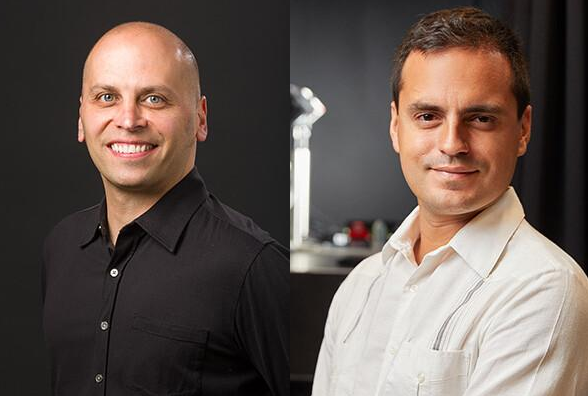
Courtesy of Yale News
Two Yale faculty members — Daniel Colón-Ramos, professor of neuroscience and cell biology, and Enrique De La Cruz, chair and professor of molecular biophysics and biochemistry and head of Branford College — and Yale alum Robert Fernandez GRD ’15 ’20 have been recognized in a list of 100 inspiring Hispanic/Latinx scientists in the U.S. by Cell Mentor. Cell Mentor is an online resource provided by Cell Press and Cell Signaling Technology with blog-style resources for early-career scientists.
In addition to strong scientific research, Colón-Ramos, De La Cruz and Fernandez have all made extensive scientific outreach efforts through their work in making science more accessible to the Hispanic/Latinx community.
“[Colón-Ramos] is a fantastic mentor and does a lot to make science more accessible … not just science accessible to people who don’t have opportunities, but also science accessible to the lay public … so that they understand the value of science,” Sreeganga Chandra, deputy chair and associate professor of neuroscience, said.
In his lab, Colón-Ramos studies the synapse — the connection between neurons. He examines how synapses are formed and how they are modified when a memory is created. Colón-Ramos’ lab studies C. elegans, a nematode worm with a simple nervous system of only 302 neurons — humans have billions — and about 5,000 chemical synapses. According to the lab’s website, Colón-Ramos has 49 publications with the lab.
According to Sterling Professor of Cell Biology James Rothman, Colón-Ramos’ work regarding synapse formation and “self-assembly mechanisms that spatially couple energy production to energy utilization” is receiving the international attention that it deserves.
Beyond research, Colón-Ramos co-founded Ciencia Puerto Rico, a network of Hispanic scientists which works to promote scientific advancement, education and careers in Puerto Rico. According to Colón-Ramos, it currently has close to 40,000 members.
“I have collaborated with many colleagues in establishing mentoring programs, in arguing for the democratization of access to science, in arguing that all societies should benefit from science, that science shouldn’t be structured as an enterprise that implicitly or explicitly excludes certain demographics or groups from participating or benefiting from the scientific enterprise,” Colón-Ramos said. “It’s a fundamental humanistic request that’s part of our culture.”
De La Cruz’s lab uses kinetics and thermodynamics to understand how mechanical forces affect chemical interactions and reactions of biological molecules. He also examined processes that were previously thought to be incomplete, such as “how regulatory proteins break actin filaments or how helicases use ATP to rearrange RNA.”
In addition to his work in the lab, De La Cruz serves as a mentor to underrepresented communities as well as his graduate students, according to Mark Hochstrasser — professor of molecular biophysics and biochemistry. Hochstrasser said this success is something that members of his department are “all proud of.”
Nandan Pandit GRD ’16 ’20, a postdoctoral associate in De La Cruz’s lab, elaborated on the guidance that De La Cruz gives to his students.
“Enrique always is looking out for the students and really prioritizing their success while still balancing the success of the lab overall … I think he really deserves this award,” Pandit said.
The third honoree, Fernandez, is currently working on postdoctoral research at Columbia University. Fernandez is studying how transcription factors regulate neuronal identity in C. elegans.
Fernandez also co-founded an initiative called Científico Latino, which aims to help underrepresented minority students navigate higher education. The site includes resources such as a database for fellowships, research programs, post-baccalaureate programs and diversity preview events.
The site also features a blog with stories and advice from underrepresented minority students and STEM faculty. Additionally, the website contains webinars aimed at preparing students for graduate school, fellowship and doctorate applications. De La Cruz also serves as a faculty adviser for this program.
“One of our biggest initiatives … is our [Graduate Student] Mentorship Initiative, where we pair you with a mentor to look over your graduate application,” Fernandez said. “It’s open to any underrepresented students, not just based on ethnicity, but low-income, first-generation, sexual orientation, disability.”
The program was piloted last year with 86 scholars participating, helping 76 get accepted into graduate school programs. This year the program is serving around 300 people.
All three scientists emphasized the importance of diversity in the laboratory. According to De La Cruz, a lack of diversity in the laboratory not only creates situations that “cry injustice” but also cause labs to miss out on tremendous talent.
“I never learned in my biology class about any Latinx scientists, so if we don’t see ourselves in science, starting off in elementary, middle school and high school, how exactly are we going to believe that we can get there?” Fernandez said. “What I love about my lab right now at Columbia [is that] it’s super diverse, and you get all of these different viewpoints, and that’s what makes science great, learning from each other, different cultures, different backgrounds. Science is not just one way of thinking. It’s a multidisciplinary way of thinking and different viewpoints help you.”
The full list of inspiring Hispanic/Latinx scientists can be found on Cell Mentor’s website.
Adam Levine | a.levine@yale.edu







